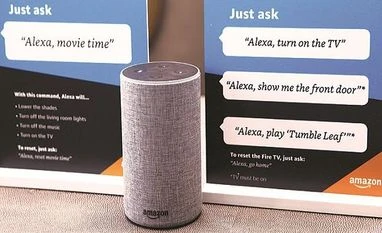Imagine a future where you are never truly alone. Even when your spouse is on a business trip or your children are away at summer camp, you will always have someone (or something) to talk to. In the morning, you could ask the microwave to heat up a bowl of oatmeal. In your car, you could tell your stereo to put on some ’90s music. And when you walk into the office, you could ask your smartphone, “What’s on my calendar today?”
This is increasingly the world the tech industry is building with a bloating portfolio of devices that can react to voice commands — and that the companies will be pitching to you even more in 2019.
The future will be on display next week at CES, a consumer electronics trade show in Las Vegas that serves as a window into the year’s hottest tech trends. Artificially intelligent virtual assistants will take centre stage as the most important tech topic, with companies big and small expected to showcase voice-controlled devices like robot vacuums, alarm clocks, refrigerators and car accessories. Most of these products will be powered by Amazon’s Alexa or Google’s Assistant, the two most popular artificially intelligent assistants, industry insiders said.
“AI will pervade the show,” said Gary Shapiro, chief executive of the Consumer Technology Association, which owns CES.
If this all sounds like a repeat of last year, that’s because much of it is. Artificial intelligence was 2018’s hottest tech trend, too. In other words, the tech industry is in a state of iteration rather than making leaps and bounds with something totally new. Other tech trends that are progressing include the debut this year of fifth-generation cellular networks, known as 5G, which will significantly quicken mobile internet speeds. Cybersecurity products for home networks are also proliferating, an important safeguard now that consumers own so many devices that can connect to the internet.
Here’s what to watch, and what to avoid.
Battle of the virtual assistants
In 2015, Amazon birthed the Echo, the artificially intelligent speaker featuring the virtual assistant known as Alexa. A year later, Google responded with Home, its smart speaker powered by Google’s own digital companion, called Assistant. Since then, in a bid to become your go-to digital companion, the two tech giants have teamed up with makers of devices like thermostats, doorbells, light bulbs and car accessories to add their virtual assistants to them. Google is expected to be even more aggressive this year with its Assistant. The company will triple the size of its presence at CES this year, suggesting that it is likely to unveil a large array of products that work with Assistant.
Lost in the hype about virtual assistants is whether people truly want an omnipresent companion involved in their everyday tasks. Owners of smart speakers mostly summoned digital assistants for basic functions like listening to music, checking the weather and setting a timer, according to research by Nielsen last year.
Security for your smart things
Plenty of people install antivirus software on their computers. But what about all the other devices that can be connected to the internet, like smart watches, phones, televisions and speakers? In an era of smart things, the Wi-Fi router is becoming a bigger target for hackers, so expect a flood of new equipment and software that offer protection by improving your network security.
For a sense of what to expect, consider Eero Plus, a subscription service that Eero, a maker of Wi-Fi equipment, released last year. Eero Plus includes protection against viruses and malware for all the devices connected to its Wi-Fi network. More should follow this year — beginning next week at CES, where Scalys plans to introduce TrustBox, a router with built-in security features.
The arrival of 5G
This year, the wireless industry will begin a big upgrade to its infrastructure. Phone carriers like AT&T and Verizon Wireless say the 5G technology will deliver data at incredibly fast speeds, allowing people to download entire movies in a few seconds. In addition to increasing smartphone speeds, 5G will be important for other types of devices, like robots, self-driving cars, drones and security cameras. The technology is expected to greatly reduce latency, or the time it takes for devices to communicate with one another.
©2019 The New York Times News Service
Unlock 30+ premium stories daily hand-picked by our editors, across devices on browser and app.
Pick your 5 favourite companies, get a daily email with all news updates on them.
Full access to our intuitive epaper - clip, save, share articles from any device; newspaper archives from 2006.
Preferential invites to Business Standard events.
Curated newsletters on markets, personal finance, policy & politics, start-ups, technology, and more.
)